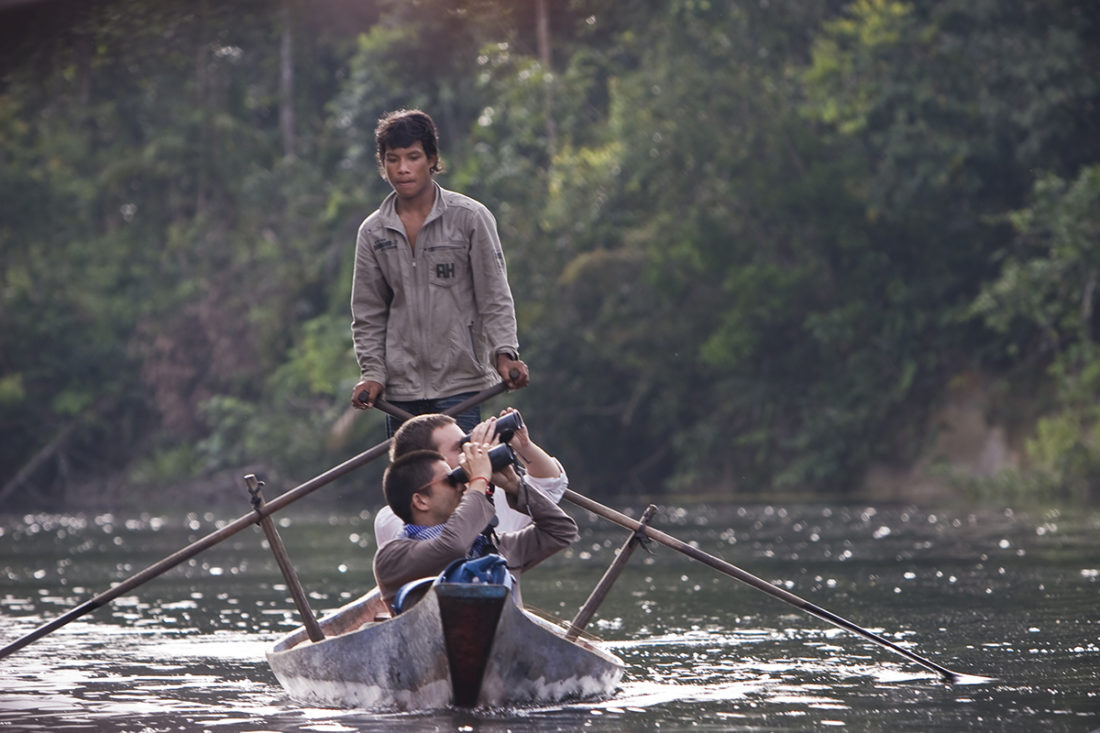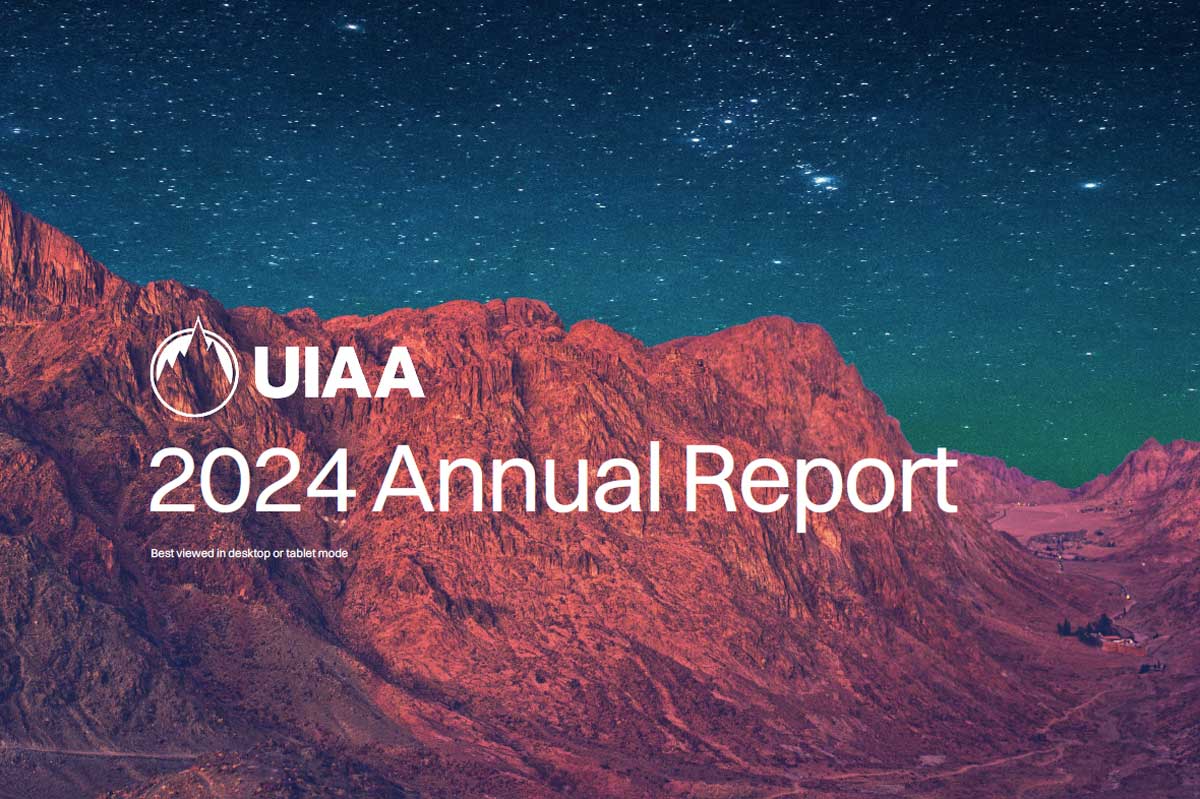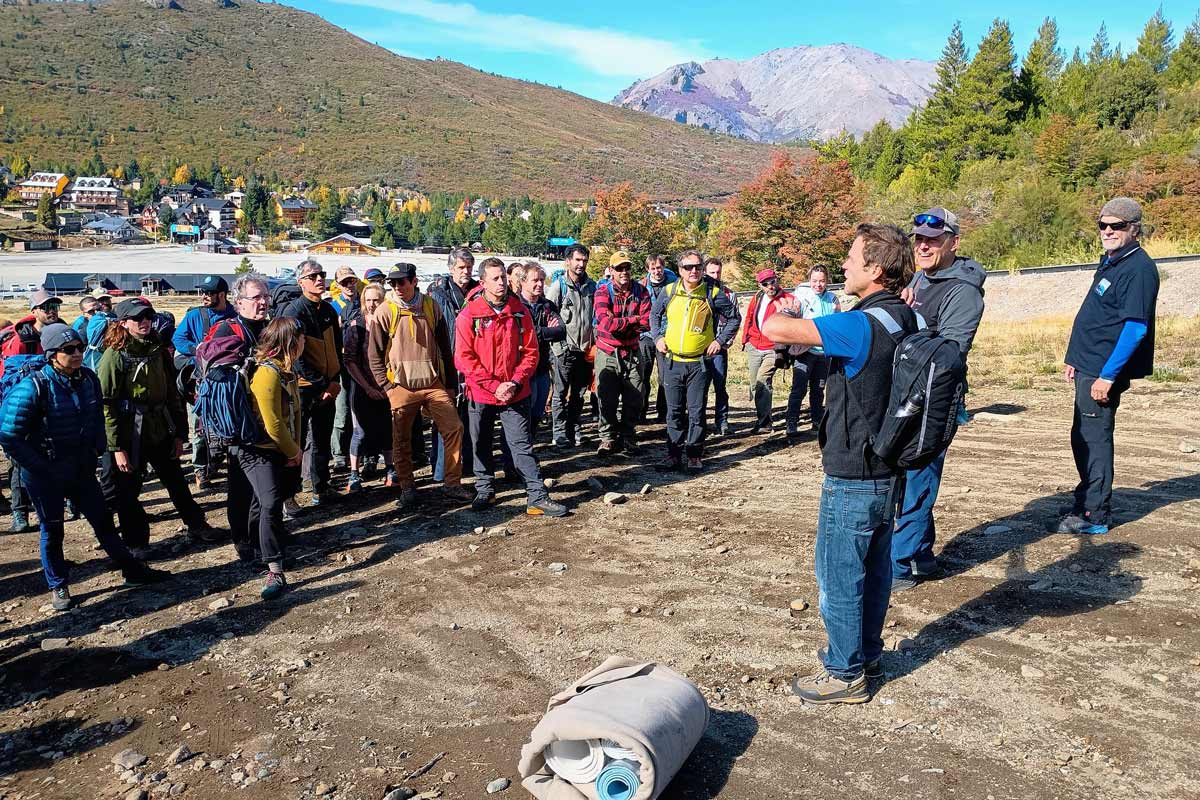GOALS AND OBJECTIVES
Chi Phat is a remote mountain community with more than 3,000 residents (632 households) located in the Cardamom Mountain Range. The Cardamoms support more than 21 threatened wildlife species on the IUCN Red List. The area has been severely affected by 20 years of civil war when rural communities depended on illegal logging, slash-and-burn cultivation, and wildlife trafficking due to poor infrastructure, low education levels, and limited economic opportunities.
In 2007, Wildlife Alliance established the Chi Phat Community-Based Ecotourism (CBET) project to reduce poaching and other threats to the mountain ecosystem through sustainable alternative livelihoods. CBET’s objectives are as follows:
– Provide alternative livelihoods to local people through technical assistance in developing an ecotourism site that enables villagers to have substantial control over and involvement in the development and management of their community.
– Assist communities with natural resource protection against illegal logging, wildlife poaching, and land encroachment, while providing tourists with a unique adventure in rarely visited rural villages.
Since 2007, the Chi Phat CBET has generated more than $800,000 for the community. Wildlife Alliance is now working with the CBET project in Chi Phat to expand this successful model to the Cardamom commune of Chhay Areng.
CONTRIBUTION TO MOUNTAIN PROTECTION
The Chi Phat CBET, which received Community-Based organization (CBO) status on October 23, 2009, fully or partially supports 340 out of 600 families of former slash-and-burn farmers, loggers and hunters who were previously working for wildlife trafficking middle men. The project also supports a Community Anti-Poaching Unit (CAPU) of 20 rangers, which has significantly reduced the snaring and trapping of wildlife, with visible recovery of wild populations in the area (bears, pangolins, elephants, small predators). Today, there is a 100 percent reduction in forest burning and an 80 percent reduction in hunting. Since joining CBET community members have abandoned activities destructive to forests and are instead earning revenues by running guesthouses and homestays, bungalows, renting mountain bikes, canoe-kayaks and trekking gear to international tourists, and providing transport and nature guiding services. Chi Phat is now regarded as Cambodia’s leading community-based ecotourism project that brings both revenue to the local community and environmental benefits to the mountain ecosystems. As such, the Chi Phat CBET program is a vital component in the long-term preservation of the Cardamom Mountains.
Since 2007, more than 18,000 international tourists have visited Chi Phat and the community has received more than $800,000 in revenue, with 80% going to the families providing the services and 20% going to the CBET Community Fund for equipment and infrastructure maintenance. Furthermore, through the Community-Based Ecotourism project, 200 students and 10 teachers were trained in waste management and disposal (i.e. littering, waste sorting, 3 Rs- reduce, reuse, recycle- and composting) that resulted in vastly improved waste management in the community. Also, 15 secondary school students serve as Chi Phat Green Ambassadors, playing an active role in raising local awareness of forest and wildlife conservation and waste recycling. One concrete step taken by the group was to connect with a potential green energy factory in Phnom Penh that converts plastic bags into diesel; this will provide a good option to help dispose of plastic bags in the community.
BENEFIT FOR LOCAL COMMUNITIES
Wildlife Alliance has worked with the Chi Phat community since 2007 to help them design an ecotourism project that the villagers could claim as their own, with a signature and brand specific to their village. We accomplished this by living with them on site and facilitating their creative process by using the Appreciative Participatory Planning and Action (APPA) methodology of the Mountain Institute in Denver, Colorado. We facilitated the voting of 16 community volunteers to work as a team and helped them to envision the Chi Phat ecotourism product. The volunteers mapped out the 12 nature attractions that they thought international tourists would enjoy the most and decided on the specific services that families needed to deliver to make the Chi Phat attractions most successful. Wildlife Alliance then helped the volunteers conduct a consultation process with the villagers in order to finalize decisions.
The next step was to form a Chi Phat management committee in charge of managing the community ecotourism activities. Wildlife Alliance facilitated a participatory process where the community had to decide on the roles and responsibilities of the management committee for each management group:
(1) CBET Tourism Reception Team,
(2) Guesthouses and Homestays Group,
(3) Cooking Group,
(4) Transportation Group,
(5) Nature Guiding Group,
(6) Waste Management Group,
(7) Community-Based Eco-Tourism Management Committee
This resulted in formalizing the Community-Based Eco-Tourism (CBET) project that was registered with the government in 2009.
The next step was to engage the Chi Phat community in a formal voting process to obtain the nomination of specific citizens to fill CBET roles by following democratic voting protocols. Wildlife Alliance was successful in facilitating this process by ensuring 1) that the Chi Phat community nominates responsible parties to lead the CBET project; 2) that the CBET project follows detailed By-Laws in managing CBET revenues and investments.
Another example of how Wildlife Alliance engaged the Chi Phat community is the negotiation on contracts to abandon destructive practices of slash-and-burn agriculture and hunting. The CBET formation process included agreements with the Chi Phat community that Wildlife Alliance assistance and investments depended on stopping destructive practices: that any family found burning or logging the forest or hunting and eating wildlife would be barred from the CBET project. This was strictly implemented and resulted in 60% reduction of families hunting wildlife in 2010 and an 80% reduction in 2015.
In implementing our Community-Based Ecotourism Project, Wildlife Alliance works closely with the Ministry of Tourism, both at the central and provincial level.
GOING BEYOND ‘BUSINESS AS USUAL’
Wildlife Alliance implements a holistic approach that addresses all drivers of environmental destruction. This includes providing conservation education to local schools and the employing Wildlife Alliance-Forestry Administration rangers at six different patrol posts. The rangers engage in daily patrols to stop illegal logging, slash and burn, and wildlife trafficking. We engage all relevant stakeholders in the design and implementation of the CBET project, and make it a point to work with and train local members for as long as needed to ensure long-term sustainability.
Wildlife Alliance upholds a code of conduct for every project participant, and members are held accountable for implementing, maintaining, respecting and contributing to the welfare of their community and surroundings. For example, we maintain codes of conduct for partners, tour operators, and individual guests, promote non-intrusive tourism, protect local traditions, archeological sites and the environment. Our forest rangers and wildlife rescue team members sign a binding contract to not engage in any illegal activities, such as poaching wildlife, selling timber or accepting bribes. Our alternative livelihood participants sign pledges stating that they will no longer resort to slash-and-burn farming, wildlife poaching, or other environmentally-destructive practices.
Chi Phat CBET also mitigates the potential negative impact of tourism. Over the last eight months, the CBET collected about 8,000 kg of rubbish (plastic 45%, metal 5%, general 50%). Currently all rubbish goes to the dump site about 2 km from the village center. A total of 63 families are using the bin and paying $1.25 per month for waste collection. The Minister of Environment has promised to donate a waste disposal oven for the future. A solar system supplies electricity to the CBET office.
In recognition of our approach, in 2014 the CBET project received two prestigious awards: the National Tourism Clean City, Clean Resort, Good Service and Good Hospitality Award from the Cambodian Ministry of Tourism and the Dubai International Award for Best Practices to Improve the Living Environment. In 2013, Lonely Planet wrote that: “Today the project is flourishing. The initially skeptical locals have warmed to the idea and are beginning to now see forest conservation in a different light. Chi Phat is seen as a model for other [Community-Based Ecotourism] projects, and delegations from around Cambodia now come here to see how it’s done.” In 2017, Chi Phat CBET won the ASEAN Eco Tourism Standard Award (2017-2019) and the ASEAN Homestay Standard Award (2016-2018 and 2017-2019).
COMMITMENT TO MOUNTAIN STEWARDSHIP
Chi Phat CBET offers opportunities to community members and visitors alike to “give back” to the environment and make sure that the Cardamom Mountains remain intact. Visitors to our ecotourism site, for example, in addition to connecting to the beauty of the Cardamom Mountains as a tourist, are also invited to (1) support the conservation of the rainforest by joining a 3-5 day patrol with the Community Rangers and experience first-hand what it takes to be a ranger and protect the flora and fauna in the forests surrounding Chi Phat; and to (2) join as an assistant in maintaining and improving village infrastructure and waste management system. With these authentic opportunities, the visitors to Chi Phat are able to fully comprehend all aspects of sustainable living and directly help the community live a more financially and environmentally friendly life.
Moreover, our CBET site welcomes volunteers to participate in a range of activities in the village that invigorate the social dynamics of the village while, at the same time, laying a real foundation for capacity enhancement, such as skills development for youths and schools. These activities include delivering English language lessons and computer skills for young adults and local nature guides, and raising awareness on hygiene and sanitation to improve the community’s healthy living practices. Volunteers may also get involved in building camping sites, painting local school, and building houses for the poor and elderly. Working with volunteers from around the world not only fosters a sense of community and pride in our shared natural heritage, but also promotes sustainable practices. In the long-term, these opportunities ensure that the Cardamom Mountains remain a protected biodiversity region.
CONTACT
Wildlife Alliance
E: touch.sophany@gmail.com
W: www.wildlifealliance.org




